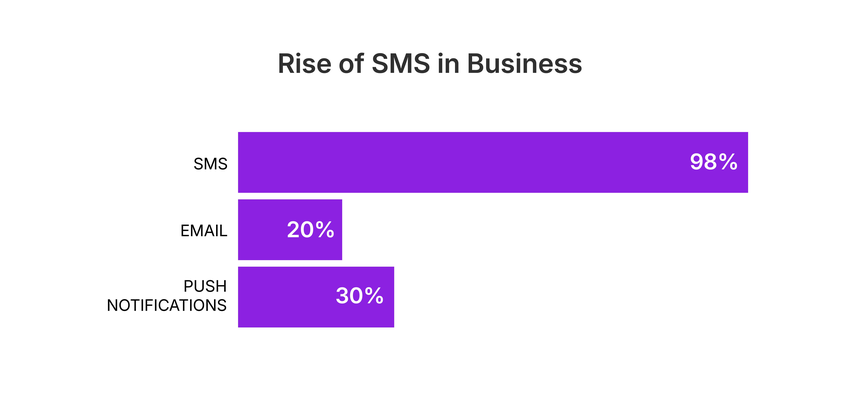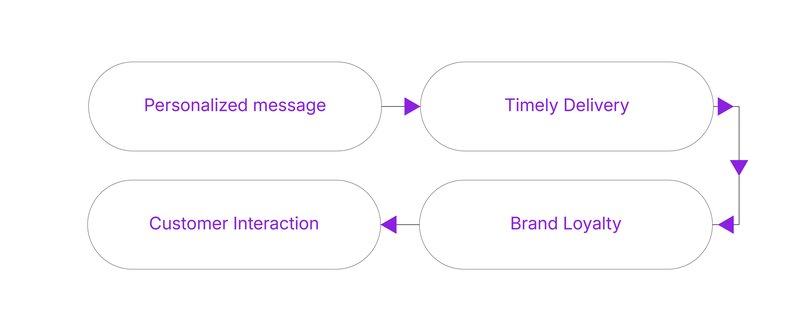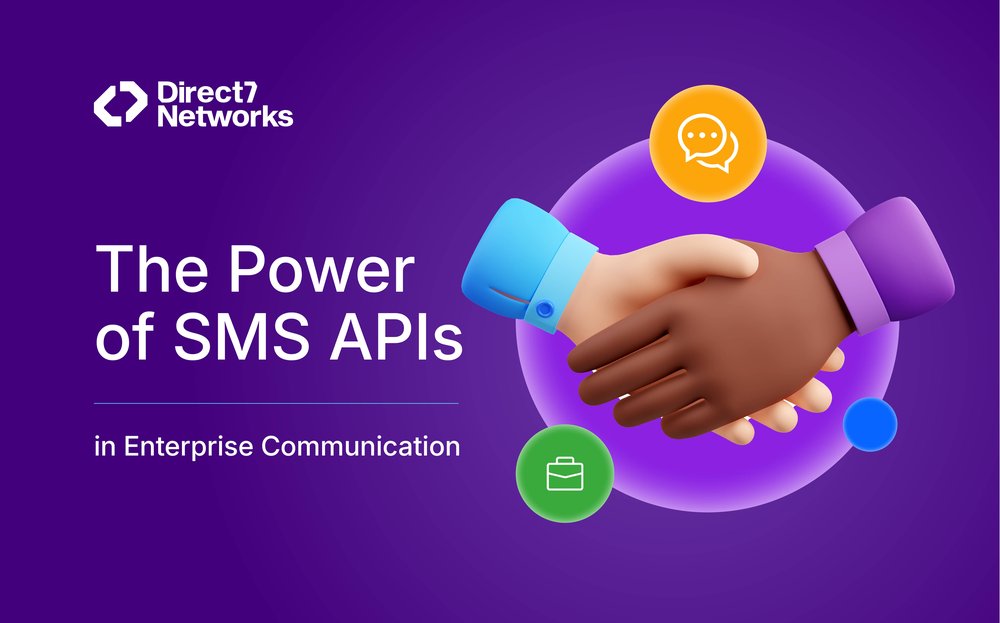Efficient communication is essential for any business's success. Among the many available tools, SMS APIs are a powerful means of enhancing communication. By integrating SMS functions directly into their systems, businesses can transform their interactions with customers and employees. Messages are delivered quickly and effectively.
Think about the ability to send instant updates, notifications, and reminders directly to your audience's phones—this is what SMS APIs can do. These tools enhance customer engagement and improve internal communication. They not only increase efficiency but also help build stronger relationships.
As businesses seek to adapt quickly, using the SMS API service is a must. Let’s explore how these solutions are changing business communication, boosting productivity, and helping businesses succeed in a digital world.
The Rise of SMS Communication in Enterprises

In today’s digital world, SMS is an important communication tool for businesses. It stands out because it is direct and reaches people effectively, with a 98% open rate compared to just 20% for emails. This high engagement makes SMS a valuable way to grab attention quickly.
SMS is simple and reliable. It only needs a mobile phone signal, so messages are delivered promptly, which is crucial for time-sensitive information like appointment reminders and order confirmations.
Companies use SMS to improve their efficiency and customer service. They can automate SMS sending through APIs, allowing them to send personalized messages to many people at once. This automation saves time and resources while still keeping a personal touch, which is great for marketing, customer support, and internal messages. The growing use of SMS shows a shift toward more effective communication in a competitive market
Key Features of SMS APIs
SMS API, or Application Programming Interfaces, are essential tools for SMS communication in businesses. These APIs let companies add SMS features directly to their existing systems, making it easy and automatic to send and receive messages. A key benefit of SMS APIs is their flexibility, allowing developers to customize the sending and management of messages based on what the business needs. This helps companies align their communication strategies with their goals and customer expectations.
Another important aspect of SMS APIs is their ability to scale. Whether a business needs to send a few hundred messages or millions, SMS APIs can handle different amounts of messages easily. This scalability is vital for companies that see changes in their communication needs, like during seasonal marketing events or emergency alerts. SMS APIs also provide detailed delivery reports and analytics, giving businesses insights into message delivery, open rates, and engagement. These insights help companies improve their communication strategies and message effectiveness.
Security is also very important for SMS APIs. With rising concerns about data privacy, reliable SMS API providers use strong measures to protect sensitive information. Features like two-factor authentication, end-to-end encryption, and secure data storage help ensure that messages are delivered safely. Additionally, SMS APIs often provide tools for managing customers’ consent, which helps businesses comply with regulations such as GDPR and TCPA. By using these features, companies can build customer trust and reduce the risks of data breaches.
Benefits of Integrating SMS APIs in Business Communication
Integrating SMS APIs into business communication brings many benefits that go beyond just sending messages. One major advantage is improved efficiency. By automating routine messages, businesses can reduce the time employees spend on these tasks. This allows staff to focus on more important work. Automation also lowers the chances of mistakes, making sure messages are correct and consistent.
Another strength of SMS APIs is customer engagement. Sending personalized and timely SMS messages can greatly improve the customer experience, creating loyalty and satisfaction. For example, when businesses send tailored promotions, appointment reminders, or order updates via SMS, customers feel appreciated and well-informed. This leads to higher engagement and repeat business. The quick delivery of SMS also ensures that important information reaches customers fast, helping businesses maintain strong relationships and quickly resolve issues.
Cost-effectiveness is another benefit of SMS APIs. SMS is generally cheaper than traditional methods like direct mail or phone calls. Sending bulk messages at a low cost makes SMS a smart choice for businesses wanting to make the most of their marketing budget. Furthermore, SMS messages have high open and response rates, improving campaign performance and increasing conversion rates. By using SMS APIs, businesses can communicate more efficiently and economically.
Use Cases of SMS APIs Across Industries
SMS APIs are useful in many industries, helping businesses solve communication problems and improve efficiency.SMS Marketing for Retail use SMS APIs to send promotions, alerts for flash sales, and updates on loyalty programs. By reaching customers directly on their phones, retailers can increase store visits and online sales. SMS APIs also allow businesses to confirm orders, track shipments, and send delivery notifications, giving customers real-time updates and enhancing their shopping experience.
In healthcare, SMS APIs provide significant benefits. Medical facilities and providers use SMS to send appointment reminders, which helps reduce missed appointments and better manage schedules. Patients get timely notifications about prescription refills, lab results, and health tips, keeping them informed about their care. During public health emergencies, SMS Marketing healthcare help quickly share important information with large groups, improving communication and response. The secure nature of SMS APIs ensures that sensitive patient information remains confidential.
In the financial services sector, SMS APIs enhance security and customer service. Banks and financial institutions send SMS alerts for transactions, fraud detection, and two-factor authentication (2FA). Customers receive instant updates on their account activity, allowing them to monitor their finances and quickly address any suspicious transactions. SMS APIs also support customer service by providing updates on accounts, payment reminders, and personalized financial advice. This real-time finance sms builds trust and transparency, which are vital.
How SMS APIs Improve Customer Engagement

Customer engagement is vital for business success, and SMS APIs are a great tool to improve it. One key way SMS APIs enhance customer engagement is through personalization. By using customer data with SMS APIs, businesses can send custom messages that match individual preferences and behaviors. Messages like birthday wishes, exclusive offers, or product recommendations make customers feel valued and understood, creating a stronger connection to the brand.
Timeliness also helps boost customer engagement with SMS APIs. Unlike emails or social media posts, which may be ignored for hours or days, people usually read SMS messages within minutes. This quick delivery is especially useful for urgent communications, like flash sales, event alerts, or important updates. By reaching customers fast, businesses can encourage immediate action and increase engagement and sales.
Interactive SMS campaigns takes customer engagement even further. 2-way sms communication, letting customers reply to messages and take part in interactive experiences. For example, businesses can run surveys, polls, or contests via SMS, encouraging customers to share their views and feedback. This interaction not only provides helpful insights but also makes customers feel included and appreciated. Plus, SMS APIs can assist with customer service, allowing customers to request information, solve problems, or give feedback easily.
SMS APIs vs. Traditional Communication Methods
When comparing SMS APIs to traditional communication methods, SMS has several clear advantages. While traditional methods like email, direct mail, and phone calls are useful, they often lack in reach, speed, and engagement. For example, emails can get lost in crowded inboxes or end up in spam folders, leading to low open rates. Direct mail can be expensive and slow, with no guarantee that the recipient will act quickly. Phone calls can feel intrusive and may not be answered, especially by busy people.
In contrast, SMS APIs provide quick and wide-reaching communication. SMS messages have a remarkable open rate of 98%, and most are read within minutes. This speed ensures that important information is delivered and acted upon quickly. Additionally, SMS does not need internet access, making it available to more people, even those in areas with poor connectivity. This broad reach is beneficial for businesses that want to connect with a wide range of customers.
Cost is another area where SMS APIs shine compared to traditional methods. Sending bulk SMS messages is much cheaper than printing and sending physical materials or making many phone calls. The cost-effectiveness of SMS allows businesses to use their resources more wisely and achieve a better return on investment. Furthermore, SMS APIs automate communication, which reduces staff workload and lowers the chance of mistakes. By using SMS APIs, businesses can improve their communication strategies while keeping costs down and maintaining efficiency.
Choosing the Right SMS API Provider
To choose an SMS API provider is a vital decision that can greatly affect how well a business communicates. When looking for a provider, several key factors should be considered to ensure they fit the company’s needs and goals.
First, reliability is essential. The provider must have a strong system that delivers messages quickly and accurately, even during busy times. If messages are delayed or fail to send, it can harm communication efforts and trust with customers.
Scalability is also crucial. As a business grows, the SMS API provider should handle more messages without losing quality. Whether running a small campaign or a large notification system, the provider should offer solutions that can expand alongside the business.
Next, if the business operates in multiple regions, it’s important to choose a provider with global reach. This means they can send messages to different countries and networks without issues, helping maintain consistent communication.
Support and security are also important when picking an SMS API provider. Look for those that provide good customer support, including help with technical issues, onboarding, and ongoing maintenance. Quick support can resolve problems efficiently and keep systems running smoothly. Additionally, ensure the provider has security features like data encryption and secure API endpoints. They should also comply with regulations like GDPR and HIPAA to protect sensitive information and maintain customer trust.
By considering these factors, businesses can find an SMS API provider that meets their communication needs and goals.
Best Practices for Implementing SMS APIs
Using SMS APIs effectively requires a solid plan to improve communication without interrupting current processes. Start by setting clear objectives. Decide what your business wants to achieve with SMS, such as enhancing customer engagement, improving internal notifications, or increasing marketing efforts. Clear goals will help guide the implementation and measure success
Next, ensure that SMS APIs work smoothly with your existing systems. They should integrate with your current software, such as customer relationship management (CRM) tools, marketing automation systems, or customer support software. This integration helps data flow easily between platforms, allowing for personalized and automated messages. It’s important to collaborate with developers and IT teams to ensure everything works well together.
Compliance is also very important when using SMS APIs. Businesses must follow rules about SMS communication, like getting proper consent from recipients and offering opt-out options. Following laws such as GDPR and TCPA is crucial to avoid legal problems and keep customer trust. Additionally, make sure to protect data and privacy through measures like encryption and secure storage. By following these steps, businesses can effectively implement SMS APIs and make the most of their communication opportunities.





